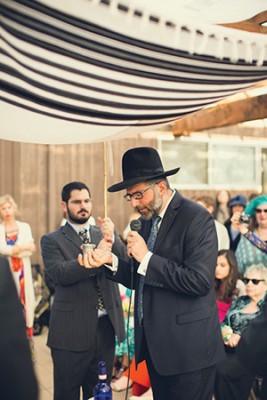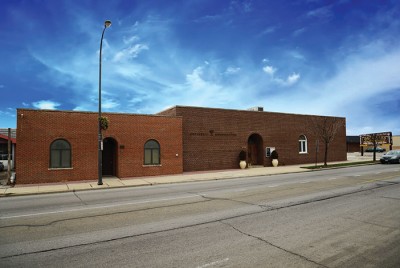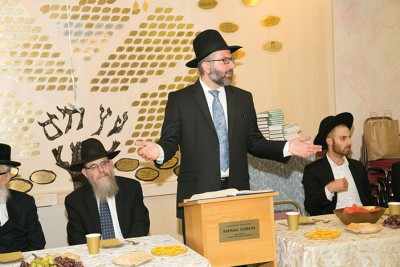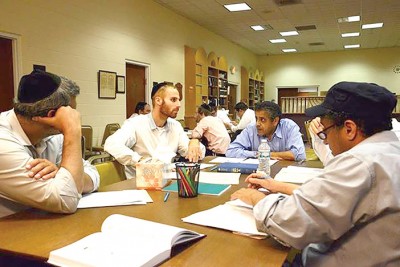




How do you measure the value of a man? Religionists and philosophers have debated this question since time immemorial. The answers offered are as varied as the numerous beliefs which colored humanity’s past in vibrant, and sometimes dull, hues. From a subjective standpoint, one can measure their own value by determining whether or not they live in accordance to their finest aspirations. Some people dream of making a fortune, while others dream of wielding power or gaining honor and fame. Then there are the few in number who hope and dream of helping people achieve happiness. Happiness itself may be relative, but there can be no doubt that those who devote their lives to its proliferation have a deep effect on their surroundings. It is therefore my pleasure to interview Rabbi Hertzel Hillel Yitzchak of the Sephardic Congregation of Evanston, Illinois.
BJL: Please tell our readers about yourself. When and where were you born? Where did you grow up?
HY: I was born in Or Yehuda, Israel, to Bukharian parents. My parents and siblings were born in Samarkand, Uzbekistan, and immigrated to Israel in the early 1970s. When I was 9, in the mid 1980s, my family and I moved to Brooklyn and then eventually to Queens. I attended Yeshivot in Brooklyn and Queens, and upon completing high school I enrolled in Queens College, where I obtained a B.A. in psychology and Hebrew. In 1999 I moved to Chicago for graduate school to obtain my Doctorate in Clinical Psychology. My intention was to return to New York upon obtaining my degree, but I fell in love with Chicago and its warm Jewish community and decided to stay.
In my last year of graduate school, while working in a clinical internship, I studied to become a rabbi in Chicago. When I completed my studies, I traveled to Israel and obtained my semicha (Rabbinic ordination) from various Rabbanim, including Rabbi David Yosef.
About nine years ago, after obtaining my Doctoral Degree and semicha, I was approached by one of the Sephardic communities in Chicago and offered the post of rabbi; their previous rabbi was retiring and was in the process of moving to Israel.
BJL: What are the demographics for Sephardic Jewry in Chicago? Please also tell our readers about your Kehilla.
HY: There are four main Sephardic Shuls in Illinois: One is in Chicago, two in Skokie, and one in Evanston. Our shul is the one in Evanston. We are a diverse and dynamic congregation with members from around the corner and around the world. We are dedicated to increasing Torah learning and observance and Ahavat Yisrael. Our synagogue is a warm and friendly spiritual home for both Sephardim and Ashkenazim alike. Our synagogue was built in 1972 and at the time, it served as a safe-haven and religious infrastructure of Sephardic immigrants from Egypt, Morocco, Turkey, and other parts of the Middle East.
BJL: Growing up in Queens, I found your sefer, Tzel HeHarim, in my shul. What does that sefer discuss, and what other books have you written since?
HY: Bechasdei Hashem, I have written three sefarim and edited a kuntres (short guide) titled Ahavat HaGer. I wrote my first sefer in response to the palpable lack of English Halachic works for Sephardic Jews. At the time, I felt that a Sephardic person who was not able to read Hebrew and learn from a sefer had to rely on halachic works in English written by and for Ashkenazim. There was very little out there for Sephradim, so I decided to do something about it, and began to write a sefer on the laws of tzitzit. This ultimately became my first sefer, published by Feldheim as Tzel HeHarim – Tzitzit. My second book is called The Daily Rituals, and includes both Sephardic and Ashkenazi rulings. This book, which was published by the Chicago Rabbinical Council, has, Baruch Hashem, been incorporated by many Batei Din (Jewish Courts) as part of their gerut (Conversion) curriculum, requiring prospective converts to study and master this book along with other books of halachah. My third book is a responsa – a collection of responses to many halachic questions I have been asked over the last nine years in my post as community rabbi. It is written in Hebrew and is geared for a scholarly and more advanced audience. I am currently working on a second volume of this book.
I am hoping that my next book in English will be on the laws of Shabbat, and I pray that the English speaking Sephardic community will benefit from it.
BJL: As a Rav, how do you address the needs of your community and what do you feel are your responsibilities towards your community members?
HY: Every rabbi needs to look at his community and determine its true needs. The way I approach my community and its members is first to create a trusting relationship between myself and the members. I then try to meet each person in whatever state and status they currently are in – spiritually, existentially, and religiously – and to elevate them to their next level, to their next phase. It’s a daunting task, but you need to do the
best you can.I try to achieve this by teaching and exposing our members to different Torah classes. For example, we have a morning and a night kollel open to the community. I give an hour-long class each Shabbat before Mincha on various contemporary issues in halachah. My wife is also a popular speaker here for women and gives classes on many different topics.
Additionally, my wife and I make a great effort to invite people for Shabbat meals, especially people who do not have family in Chicago. Inviting people for Shabbat not only allows us to get to know someone on a deeper, more intimate level, but opening your house also creates a more meaningful and trusting relationship.
BJL: Does your training in psychology help with your rabbinical duties?
HY: Absolutely. The skills that a person gains when training to become a psychologist become part of who they are forever. It’s like getting a permanent set of contact lenses attached to your eyes – you simply cannot take them off at will. You see the world and the people around you, even yourself, from a different lens. You have tremendous insight into people, why they behave in certain ways, and at times even predicting future behaviors. As a shul rabbi, you meet people with so many different backgrounds and personalities – you need to learn how to navigate, accept, tolerate, and love each and every one of them. But having gained the skills in psychology definitely helps in this process.
What drives you to do the work that you do as a rabbi?
HY: I truly love the people with whom I work; I really care about each person that walks through my synagogue doors. I’ve cooked many, many meals for my congregants at shul functions. Although you are not likely to find many rabbis who cook for their congregants, it’s my way of showing the people in my shul how much I love and care for them – just as a parent prepares a meal and feeds his child. When you care for someone, when you know that you are making a difference in someone’s life, even when it’s not immediately evident, that’s what gives me strength – that is my drive. Playing an important in role in other people’s lives as they grow and fulfill their potential is an enormous responsibility. It has many ups and downs. But it’s greatly rewarding and it’s what keeps me going.
BJL: Do you have any particular messages for our readers based on your experiences as a Rav?
HY: Seek guidance from people who are wiser than you and who have more life experience. Find someone with whom you can connect. Someone that you trust. Someone you look up to. Someone that you would like to emulate. It is difficult to navigate through life without the appropriate guidance and role models. As rabbis we hope to be that role model and guide and hope that people take the time and advantage of what we are able to offer.
By Adam Suionov
A Talk With Rabbi Hertzel Hillel Yitzchak: Author, Psychologist, And Rav Of The Sephardic Congregation Of Evanston, Illinois
Typography
- Smaller Small Medium Big Bigger
- Default Helvetica Segoe Georgia Times
- Reading Mode




